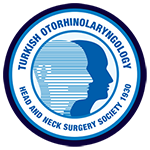ABSTRACT
Objectives:
The aim of this study is to understand the quality of endoscopic sinus surgery (ESS) training given to residents in our clinic and to compare the complications of surgery performed by residents and specialists.
Methods:
We reviewed the video records, patient’s charts and control findings of 132 patients who underwent ESS at the department of Otorhinolaryngology-Head and Neck Surgery of Sisli Etfal Teaching and Training Hospital between May 2001 and December 2004 retrospectively. The complication types and rates were compared by combining the surgical team (specialist-third year resident) and diagnosis. Surgeries done by third year resident were limited to ESS. The complications were separated into two groups as major and minor.
Results:
In this study 16.7% of the 132 cases presented by minor complications and no major complications were observed. The complication rates of the specialist and the third year resident under supervision were 17.8% and 14.3%, respectively. There were no significant difference between the complication rates of the specialist and third year resident.
Conclusion:
ESS has emerged to be superior treatment for chronic sinusitis in the last decade. We suggest that minimal functional endoscopic sinus surgery (FESS) in Otolaryngology residency training program is a relatively safe procedure when it is performed under supervision.
ÖZET
Amaç:
Kliniğimizde asistana verilen endoskopik sinüs cerrahisi (ESC) eğitimi kalitesinin anlaşılması ve ortaya çıkan komplikasyonların literatürde bildirilenlerle karşılaştırılması amacıyla uzman doktorların ve kıdemli asistan doktorların yaptığı ESC sonrası ortaya çıkan komplikasyonları değerlendirmek.
Yöntem:
Mayıs 2001-Aralık 2004 yılları arasında Şişli Etfal Eğitim ve Araştırma Hastanesi 2. KBB Kliniği'nde endoskopik sinüs cerrahisi uygulanmış 132 hastanın ameliyatının video kaydı, dosyası ve kontrol kartları retrospektif olarak incelendi. Komplikasyon tipi ve oranları cerrahi ekip (uzman - kıdemli asistan) özelliği ile karşılaştırıldı. Kıdemli asistanlarının yaptığı olgular minimal fonksiyonel endoskopik sinüs cerrahisi ile sınırlı tutuldu. Komplikasyonlar majör ve minör olarak ikiye ayrıldı.
Bulgular:
İncelenen 132 hastanın 22'sinde (%16.7) minör komplikasyon gelişti. Majör komplikasyon gelişmedi. Deneyimli uzman doktorlar tarafından yapılan operasyonlarda komplikasyon oranı %17.8 iken, uzman doktor gözetiminde yapılan kıdemli asistan doktor olgularında bu oran %14.3 olarak bulundu. Uzman doktor ve kıdemli asistan doktorların yaptığı cerrahiler sonrası oluşan komplikasyon oranları arasında anlamlı bir fark bulunmamıştır.
Sonuç:
Son yıllarda sinüzit tedavisinde ESC seçkin tedavi olma yolunda ilerlemektedir. Asistan doktorların fonksiyonel endoskopik sinüs cerrahisi (FESC) uygulamaları uzmanlık eğitimi sırasında, uzman doktor gözetiminde minimal endoskopik girişimlerde sınırlı kalmak kaydıyla güvenlidir.



